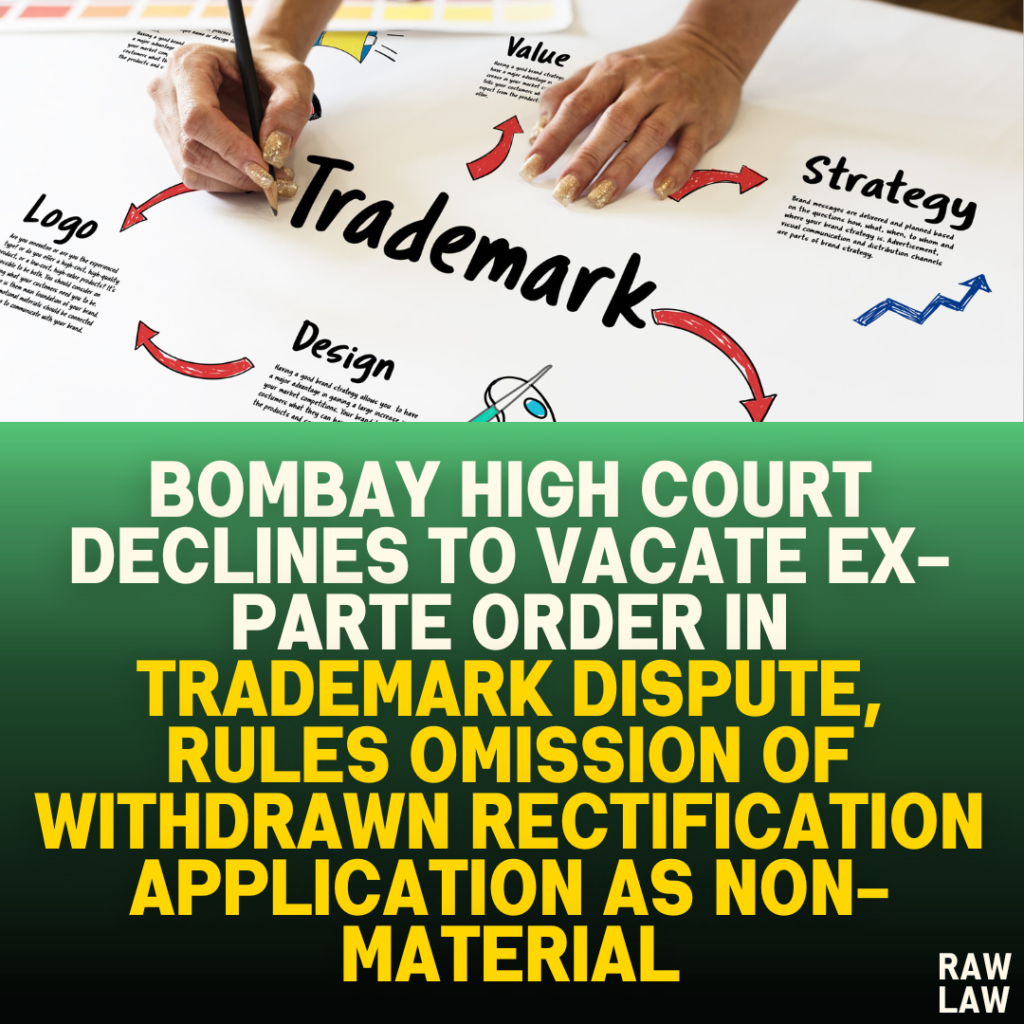Court’s Decision:
The Bombay High Court ruled that the defendant’s interim application under Order XXXIX Rule 4 of the Code of Civil Procedure, 1908, seeking to vacate an ex-parte interim injunction granted in favor of the plaintiffs, did not sufficiently establish that the plaintiffs had made knowingly false or misleading statements. The Court held that the plaintiffs disclosed the essential fact that they had challenged the defendant’s trademark registration, despite the defendant’s assertion of suppressed information in earlier rectification applications.
Facts:
The plaintiffs, owners of a registered trademark for “MAZELO,” filed a suit for passing off, seeking ex-parte ad-interim relief to prevent the defendants from using the mark “MAZE” for a similar line of confectionary products. The plaintiffs argued that “MAZELO” is a coined term unrelated to the product’s characteristics. The defendants contested the plaintiffs’ claim, asserting that the plaintiffs had prior knowledge of their mark since 2019 and that the plaintiffs misled the Court by omitting material facts, specifically details in the First Rectification Application that questioned the uniqueness of the “MAZELO” mark.
Issues:
- Whether the plaintiffs failed to disclose material facts, thereby misleading the court.
- Whether the plaintiffs had prior knowledge of the defendants’ “MAZE” mark.
- If failure to disclose the First Rectification Application influenced the Court’s grant of ex-parte relief.
Petitioner’s Arguments:
The plaintiffs argued that they had sufficiently disclosed all material facts, including their challenge to the defendant’s mark in ongoing rectification proceedings. They claimed that the mark “MAZELO” was registered and thus presumed distinctive, dismissing the relevance of prior statements in the withdrawn First Rectification Application.
Respondent’s Arguments:
The defendants contended that the plaintiffs suppressed facts, particularly their initial description of “MAZELO” as phonetically similar to “मजे लो” (meaning “to relish” in Hindi) in the First Rectification Application. This omission, they argued, could have influenced the Court’s initial decision, as it suggested the mark was generic and not unique. They also argued that the plaintiffs were aware of the “MAZE” mark since 2019 and thus should not have obtained an ex-parte order.
Analysis of the Law:
Order XXXIX Rule 4 of the CPC allows for vacating ex-parte orders if false or misleading statements are made knowingly. For vacating an injunction, the alleged non-disclosures must pertain to material particulars that could impact the Court’s decision on granting relief.
Precedent Analysis:
The Court analyzed prior rulings, including Laser Shaving (India) Pvt. Ltd., to understand the threshold for disclosure obligations in cases involving rectification applications. It noted that relevant proceedings, such as those with the Trademark Registry, should generally be disclosed, but only if they meet materiality criteria.
Court’s Reasoning:
The Court reasoned that while plaintiffs must demonstrate candor in ex-parte applications, the omission of the withdrawn First Rectification Application did not constitute a material misrepresentation. The explanation of “MAZELO” in the First Rectification Application was not inconsistent with the plaintiffs’ position in the suit and did not impact the Court’s assessment of the trademark’s distinctiveness.
Conclusion:
The Court declined to vacate the ex-parte order, concluding that the defendants did not substantiate that the plaintiffs’ omissions were materially misleading. The ruling emphasized that the duty of disclosure does not extend to every prior statement but rather to material facts impacting the basis of relief sought.
Implications:
This decision reinforces the standards for disclosing rectification proceedings in trademark disputes, particularly regarding the duty of candor in ex-parte applications. It also clarifies that materiality, rather than exhaustive disclosure, is crucial in assessing whether omissions justify vacating interim orders.




Pingback: "High Court of Himachal Pradesh Emphasizes ‘Principle of Natural Justice’ in Dismissing Appeal: Affirms ‘Without Substantive Evidence or Procedural Misconduct, an Appeal Cannot Be Sustained’ Amid Detailed Examination of Procedural Compliance